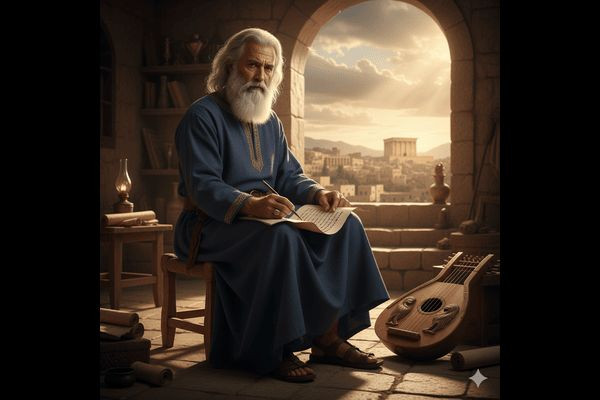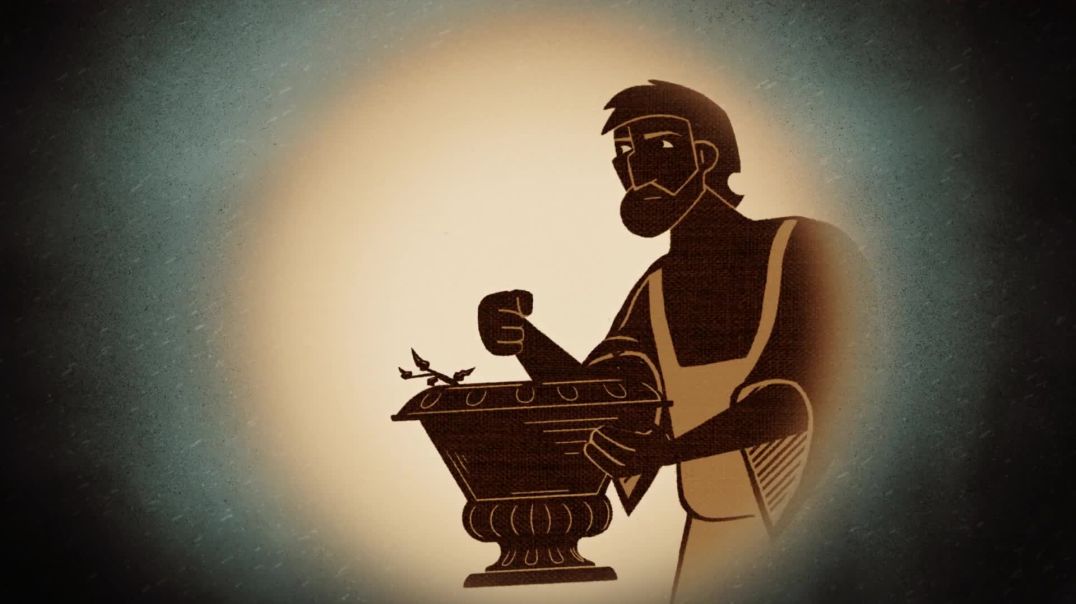King David: The Shepherd, Warrior, and King of Israel
The figure of King David stands as the monumental cornerstone of biblical history, transcending the role of mere monarch to become the eternal prototype of Israel’s ideal king. His life, recounted primarily in the Books of 1 and 2 Samuel, the Book of Kings, and the Book of Chronicles, is perhaps the most fully developed biography in the Old Testament—a narrative tapestry woven with threads of deep faith, military genius, passionate poetry, profound repentance, and tragic human error. From his humble origins as a shepherd boy in Bethlehem to the establishment of an empire and an eternal dynasty, David’s story is a compelling testament to the complex relationship between divine purpose and human frailty.
The Anointing: From Pasture to Palace
David, whose name means "beloved," was the youngest of the eight sons of Jesse, a respected resident of Bethlehem. In the early 11th century BCE, the Kingdom of Israel, still a young federation of tribes, was ruled by its first king, Saul. Saul, chosen for his stature and martial prowess, had failed to fully obey the commands of God, leading to his rejection by the prophet Samuel.
God directed Samuel to Jesse’s household to anoint a new king. Samuel, looking at Jesse’s tall, capable elder sons, was ready to choose one, but the divine instruction was clear: "Do not look on his appearance or on the height of his stature, because I have rejected him; for the Lord sees not as man sees: man looks on the outward appearance, but the Lord looks on the heart."
It was only after all seven elder brothers had been dismissed that Jesse remembered his youngest, David, who was tending the sheep. When the young David arrived—ruddy, handsome, and with a bright look in his eyes—Samuel poured the anointing oil over his head. This simple, clandestine ceremony in a shepherd’s home marked the divine transfer of the spiritual mandate to rule Israel, setting David on an irreversible path toward the throne, though the political reality was still years away.
Goliath: The Triumph of Faith Over Might
David's initial entry into public life was not as a king, but as a soothing musician in the court of the increasingly troubled and melancholic King Saul. David’s skill on the harp was said to calm the king's troubled spirit. However, his rise to national fame was sealed by an act of spectacular courage against the Philistines, Israel's most formidable and constant foe.
The Philistines and the Israelites had arrayed their armies for battle in the Valley of Elah. Standing between the two camps was Goliath, a gigantic champion from Gath, armed with heavy bronze and iron. For forty days, Goliath defied Israel, challenging them to send a single champion to decide the war, but no Israelite soldier dared to face him.
David arrived at the camp merely to deliver provisions to his brothers. Outraged by Goliath’s insults against the armies of the living God, David volunteered to fight, dismissing Saul’s hesitation about his youth and lack of armor. His confidence was rooted not in his own strength, but in his past experiences defending his flock against lions and bears, which he saw as evidence of God's protection.
Refusing the heavy, cumbersome royal armor, David took only his shepherd’s staff, five smooth stones from the brook, and his sling. The battle became the ultimate biblical metaphor: the small, humble individual relying on faith against the overwhelming brute force of the world. With a single, well-placed stone, David felled the giant, and using Goliath’s own sword, beheaded him, turning the tide of the war and making David an instant national hero.
http://googleusercontent.com/image_generation_content/0
The Fugitive: Saul’s Jealousy and the Outlaw Years
David’s victory over Goliath launched him into military command, where he experienced immediate and explosive success. The public adored him, singing: "Saul has struck down his thousands, and David his ten thousands." This chorus of praise awakened a terrible jealousy in Saul. Jonathan, Saul’s son, developed an immediate and deep bond with David—a friendship described as the purest in the Bible—but Saul saw David only as a rival to his throne.
Saul’s jealousy escalated from paranoia to active murder attempts. For years, David was forced to flee, abandoning the palace life and becoming an outlaw. He gathered around him a motley crew of followers—the distressed, the indebted, and the discontented—who formed the nucleus of his future army.
During this period of exile, chronicled in the caves of Adullam and the Wilderness of En Gedi, David faced immense psychological and physical hardship. Yet, it was during these years that his spiritual depth was most acutely honed. Many of the Psalms attributed to him are born of this period of fear, confusion, and desperate hope, such as Psalm 54 and Psalm 57, reflecting his unwavering faith even while hunted by the sitting king. David twice had the opportunity to kill Saul but refused, maintaining his reverence for "the Lord’s anointed." This period cemented David’s character: a resilient leader who understood loyalty, hardship, and the moral weight of leadership.
Unification and the Founding of Jerusalem
Following the deaths of Saul and Jonathan in battle against the Philistines at Mount Gilboa, David, after a period of mourning, was anointed King of Judah in Hebron. For seven and a half years, Israel remained divided, with Saul's surviving son, Ish-bosheth, reigning over the northern tribes.
After Ish-bosheth’s eventual assassination, the elders of all twelve tribes of Israel came to David in Hebron, acknowledging him as their legitimate, God-chosen ruler. At the age of 30, David was crowned King over all Israel.
His first strategic act as the unifying king was to seek a new, neutral capital that could serve as the political and spiritual center for both the northern and southern tribes. He chose the Jebusite stronghold of Jerusalem, a city perched strategically on a hill, unconquered by Israel since the time of Joshua. The Jebusites mocked him, claiming their blind and lame defenders were sufficient. David's forces, led by Joab, captured the city via a bold infiltration through the city's water shaft (the tzinnor).
Renaming the city the "City of David" (Zion), he established a powerful, centralized monarchy. He defeated the Philistines decisively, annexing vital territories and establishing an empire that stretched from the border of Egypt to the Euphrates River, securing Israel’s borders and ushering in a period of unprecedented stability and prosperity.
The Ark of the Covenant and the Davidic Covenant
David quickly realized that Jerusalem must be more than just a political capital; it needed to be the spiritual heart of the nation. He resolved to bring the Ark of the Covenant, the most sacred object in Israel—containing the tablets of the Law and symbolizing the presence of God—to Jerusalem.
His first attempt failed tragically. Transporting the Ark on a cart, as the Philistines had done, led to the death of Uzzah when he touched the Ark to steady it (2 Samuel 6). David recognized that he had disregarded the divine instruction that the Ark must only be carried by Levites using poles.
After a three-month period of reflection and re-preparation, David successfully brought the Ark into Jerusalem. The procession was one of immense religious fervor. David, abandoning the dignity of his royal robes, dressed in a simple linen ephod and danced before the Lord with all his might, an act that drew the contempt of his wife Michal, Saul’s daughter. David’s ecstatic worship, however, cemented Jerusalem’s status as the rightful dwelling place of God’s presence.
With the Ark safely housed in a tent he pitched, David desired to build a permanent temple—a House for God—since he lived in a magnificent cedar palace. The prophet Nathan conveyed God’s response: David, a man of constant warfare, would not build the temple; his son would. Instead, God made an unconditional promise, known as the Davidic Covenant.
This covenant was the single most pivotal moment of David’s reign (2 Samuel 7). God promised David three things concerning his "house" (dynasty):
-
David would never lack a descendant to sit on the throne of Israel.
-
God would establish that descendant's kingdom forever.
-
This eternal king would be like a son to God.
This promise transformed David’s historical reign into an eternal, messianic hope, establishing his lineage as the royal line from which the Messiah would eventually come.
http://googleusercontent.com/image_generation_content/1
The Golden Age and the Great Sin
The middle of David’s forty-year reign represents the apex of Israelite power and culture. The kingdom was at peace, the royal court thrived, and David’s spiritual gifts flowered into the poetry that fills the Book of Psalms. He oversaw the expansion of organized worship, integrating music and song into the religious life of the nation.
Yet, it was in this moment of greatest stability and security that David committed the most devastating error of his life, recorded with unflinching honesty in 2 Samuel 11—the sin with Bathsheba.
While his armies, led by Joab, were campaigning against the Ammonites, David remained in Jerusalem. From his rooftop, he saw a beautiful woman, Bathsheba, bathing. Giving in to temptation, he sent for her and committed adultery, resulting in her pregnancy.
David attempted a cover-up: he summoned Bathsheba's husband, Uriah the Hittite—one of David’s most loyal and elite soldiers, one of the Mighty Men—from the battlefield, hoping Uriah would sleep with his wife and thus account for the pregnancy. Uriah, displaying a profound honor and loyalty that shamed the king, refused to enjoy comforts while his comrades were fighting.
The cover-up failed, leading David to enact a far graver sin: murder. He sent Uriah back to the front lines with a letter instructing Joab to place Uriah in the thickest part of the battle and then withdraw, ensuring his death. Uriah was killed, and David married Bathsheba after her period of mourning.
Repentance and the Consequences of Sin
"The thing that David had done displeased the Lord." God sent the prophet Nathan, who confronted David with a powerful parable: a rich man with many flocks stole and slaughtered the single beloved lamb of a poor man. David, consumed by righteous anger, demanded that the rich man pay fourfold and die. Nathan then delivered the crushing verdict: "You are the man!"
David immediately confessed: "I have sinned against the Lord." His confession was absolute, and though God forgave David’s life, the consequences of the sin were inescapable, as Nathan foretold: the sword would never depart from his house, and the child conceived in sin would die. The infant fell ill and died, leading David to write the great psalm of repentance, Psalm 51: "Create in me a clean heart, O God, and renew a steadfast spirit within me."
The consequences played out in his family, a tragic domino effect of violence and betrayal:
-
Amnon’s Incest: David’s eldest son, Amnon, raped his half-sister, Tamar. David did nothing to punish him, creating a vacuum of justice.
-
Absalom’s Revenge and Rebellion: Absalom, Tamar’s full brother, took revenge by murdering Amnon two years later. After a period of exile and return, Absalom, handsome and charismatic, began to steal the hearts of the people, eventually raising a massive rebellion and forcing David to flee Jerusalem once again.
The civil war between father and son culminated in the death of Absalom. Though David commanded his generals to “deal gently with the young man Absalom,” Joab killed him to save the kingdom from further bloodshed.
Upon hearing the news, David’s heart broke, and his personal tragedy overshadowed the national victory. He cried out one of the most poignant laments in all literature: "O my son Absalom, my son, my son Absalom! Would I had died instead of you, O Absalom, my son, my son!"
http://googleusercontent.com/image_generation_content/2
The Final Years and the Eternal Throne
The latter years of David’s life were devoted to stabilizing his kingdom after the rebellions and preparing for the building of the Temple. Having been forbidden by God to build the sanctuary himself, David accumulated the vast wealth, cedar, and stone necessary for the task, setting the spiritual and organizational groundwork for his successor.
His final challenge involved a tense succession struggle between his elder surviving son, Adonijah, and Bathsheba’s son, Solomon. Guided by Nathan the prophet and Bathsheba, David publicly proclaimed Solomon as the next king of Israel, ensuring a smooth transition of power.
David died at the age of 70, having reigned for forty years—seven and a half years over Judah in Hebron, and thirty-three years over all Israel in Jerusalem. His last words were not only a charge to Solomon to remain faithful but a final prophetic reflection on his own life and God’s covenant promise.
The Enduring Legacy: Man After God’s Own Heart
David is remembered not because he was flawless, but because of his fundamental posture toward God. He was not a man without sin, but a man after God’s own heart (1 Samuel 13:14). His legacy is defined by three enduring pillars:
-
The Psalms: David remains the "Sweet Singer of Israel." The 73 Psalms attributed to him are the ultimate manual of human emotion and spiritual honesty, providing a liturgy for all of life, from glorious praise (Psalm 8) to gut-wrenching despair (Psalm 22) and profound repentance (Psalm 51).
-
Jerusalem: By conquering Jerusalem and establishing it as both the political capital and the spiritual home of the Ark, he ensured that the city would forever be known as the City of David and the central locus of Israel’s faith.
-
The Messianic Line: The unconditional nature of the Davidic Covenant—the promise of an eternal throne—made David the progenitor of the ultimate King. Throughout the remainder of the Bible, from the prophets to the New Testament, the hope of redemption is tied to the Son of David, culminating in the Christian belief that Jesus Christ is the promised fulfillment of David's eternal lineage.
The story of King David is a mirror to humanity itself: a portrait of exceptional divine favor marred by human corruption, yet redeemed by genuine, heartfelt repentance. He remains a singular figure—the shepherd boy who conquered a giant, the warrior who founded an empire, the poet who voiced the soul of a nation, and the flawed king whose throne was guaranteed for eternity.
Images for the Article
Image 1: David and Goliath http://googleusercontent.com/image_generation_content/0
Image 2: David Dancing Before the Ark http://googleusercontent.com/image_generation_content/1
Image 3: David's Lament for Absalom http://googleusercontent.com/image_generation_content/2








